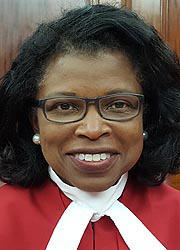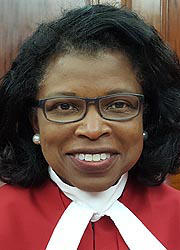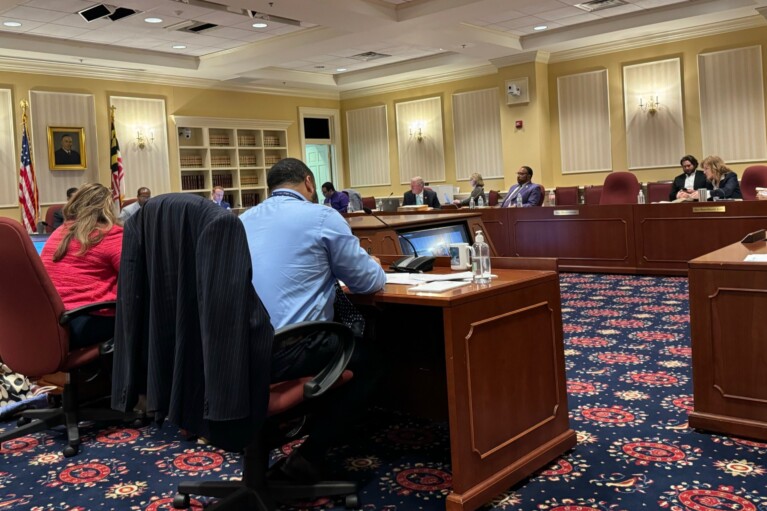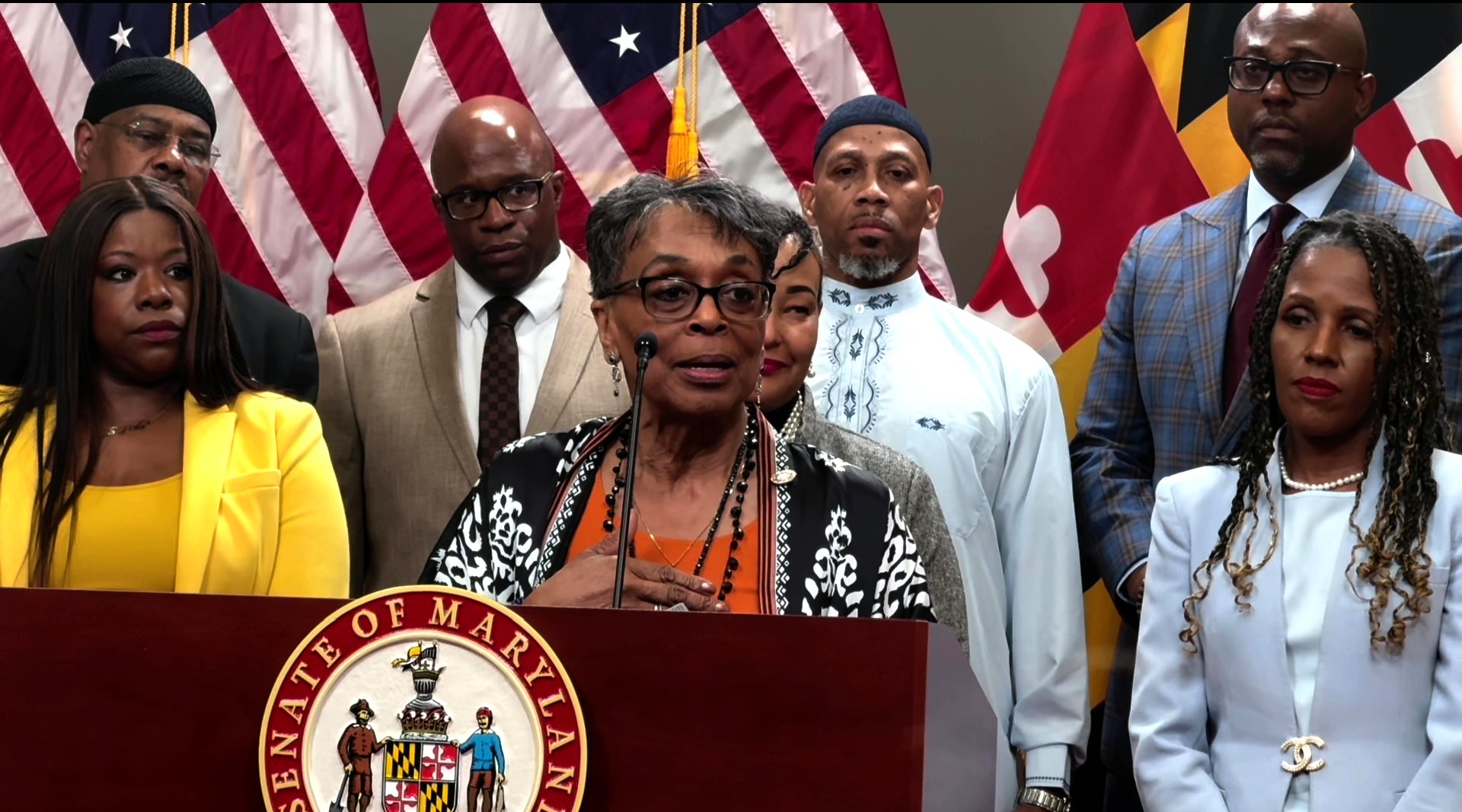Maryland’s Top Court Rules 5-2 to Keep Ex-Senator on Primary Ballot

Maryland’s highest court ruled Wednesday that former state Sen. Nathaniel T. Oaks’ name will remain on the 41st District ballot in the June 26 Democratic primary election, despite his pleading guilty to two federal felonies and later cancelling his voter registration.
On a 5-2 decision, the Court of Appeals overturned a trial court’s April 27 preliminary injunction ordering the Maryland State Board of Elections to remove Oaks’ name from the ballot because not doing so would cause “harm to the voters by way of potential confusion, inadvertence, and/or mischief by the appearance of a disqualified name on the ballot.”
Chief Judge Mary Ellen Barbera signed the appellate court’s order sending the case back to the Anne Arundel County Circuit Judge Glenn L. Klavans for dismissal. A full written opinion will be issued at a later date.

Judge Shirley M. Watts of Baltimore City and Judge Michele D. Hotten of Prince George’s County, both of whom closely questioned lawyers for both sides during Wednesday’s hour-long hearing, dissented from the majority opinion.
The decision means that Oaks’ name will appear twice on the 41st District ballot, as a candidate for both the Maryland Senate and Baltimore City Democratic State Central Committee.
It was unclear Wednesday evening if the State Board of Elections would post signs or take other measures at 41st District polling places on election day to notify voters that Oaks is not an eligible candidate, despite the appearance of his name twice on the ballot.
“We are disappointed in the result,” said H. Mark Stichel, lead attorney for three voters who sought removal of the ex-lawmaker’s name from the ballot. “But, we hope that the case has raised awareness in Legislative District 41 that any vote cast for Mr. Oaks on the primary election ballot is a wasted vote.
“We also hope that the General Assembly next year will consider changes to the election law to address issues that we raised in the case,” Stichel said.
He and colleague Elizabeth A. Harlan represented Nancy Lord Lewin, Elinor G. “Ellie” Mitchell and Christopher R. Ervin, political activists from the 41st District, in the case.
Oaks’ name will remain on the ballot because, as state officials have maintained, he was a qualified candidate at the time of a Feb. 27 primary election filing deadline and the subsequent withdraw and disqualification dates.
The West Baltimore Democrat has since withdrawn his Maryland voter registration, making himself ineligible, and therefore unqualified, to run for or hold office, but that did not sway the high court judges Wednesday.
Although Oaks, 71, was under indictment at the time of the February filing deadline, he did not plead guilty for another month to two charges of wire fraud and honest services wire fraud stemming from a federal political corruption probe in which he took $15,300 in bribes from an FBI undercover source.
Two hours before his March 29 plea, Oaks resigned his Maryland Senate seat. He is scheduled to be sentenced July 17, three weeks after the primary.
State officials have maintained – and argued successfully Wednesday before the Court of Appeals – that there is nothing in Maryland law that allows election officials to remove Oaks’ name from the ballot, given the circumstances and timing of his situation.
Oaks’ name will appear on the 41st District ballot with two other Democrats vying for the Senate seat, Jill P. Carter – who was appointed Monday by Republican Gov. Lawrence J. Hogan Jr. to finish the last 8 1/2 months of the term — and J.D. Merrill, a relative political newcomer.
Supporters of Carter, a former member of the House of Delegates, wanted to see Oaks’ name removed because they fear that it will draw votes away from her and to the advantage of Merrill.
Oaks’ name also appears in a second spot on the ballot with 23 other candidates for the seven-member 41st District Democratic State Central Committee, which includes two of the plaintiffs in the court case, Mitchell and Ervin.
Stichel and Harland first filed the case April 9 in Anne Arundel County Circuit Court, though it was not heard for another 11 days.
After considering arguments and testimony April 20, Klavans, the trial judge, initially ruled that Oaks’ name had to remain on the ballot because he technically was still a qualified candidate, despite awaiting sentencing after pleading guilty to the two federal felonies.
In ruling from the bench, however, Klavans did allow that his decision might be different, were Oaks not qualified to run for office.
After the ruling, Stichel and Harlan then asked Oaks, through his criminal defense lawyer, to cancel his voter registration, which he did on April 23, prompting the lawyers to file a motion for the court to reconsider its decision.
Though on vacation by then, Klavans took the matter back up and ruled April 26 that because Oaks voluntarily removed his name from the Maryland voter rolls – and therefore was no longer a qualified candidate — the elections board had to remove the disgraced legislator’s name from the ballot and ordered officials to do so.
But on Friday, April 27, acting on a motion by the attorney general’s office on behalf of the elections board, Barbera stayed Klavans’ order, which allowed the state to continue its process for printing the primary election ballots – including those with Oaks’ name.
The chief judge then scheduled oral arguments before the high court for Wednesday.
The emergency hearing before the Court of Appeals prompted a rather spirited debate as the seven judges peppered the two lawyers for both sides with questions.
Andrea W. Trento, an assistant attorney general for the State Board of Elections, presented the case for leaving alone the complicated process of proofing, testing and printing the ballots, maintaining that the Anne Arundel County Circuit judge had erred in ordering Oaks’ name removed.
The back-and-forth between the judges and lawyers quickly went deep into the weeds, with the finer points of election law, its application and its deadlines discussed in great detail.
Judge Joseph M. Getty seemed sympathetic to the state’s case and at one point seized on Trento’s assertion that Oaks “manufactured his own disqualification” by withdrawing his voter registration.
Getty, a former member of the state Senate and the House of Delegates, had served on the Task Force to Review the State’s Election Law in 1995 and later on the Commission to Revise the Election Code, which issued its final report in 1997.
“The issue, I think, is if we allow the manufacturing and engineering of disqualification in this case, then you’ve opened up the Election Code” to being subverted, Getty said. “You don’t want the system to be gamed.”
Stichel said he thought the notion that candidates would withdraw their voter registration to get off the ballot “ignores reality,” but that if there were an instance of abuse, it could be handled by future legislation or by the elections board.
But Watts interrupted to ask Stichel, “I’m sorry, but isn’t this allegation of a manufactured disqualification really something of a red herring?”
The issue, Watts asserted, is not a question of disqualification of a candidate, but rather a question of the applicability of a section of state election law dealing with a remedy for citizens in cases where the outcome of an election is in doubt.
Trento then began his response to Stichel’s case.
But in short order, clearly exercised by the matter, Watts returned to an earlier statement about how Oaks could draw votes away from other candidates, given that he had run for office in West Baltimore in eight previous elections and his name was well known to voters.
“This is not a complaint of Senator Oaks,” she said.
“I didn’t mean to characterize it that way,” Trento said. “The voters are asking this.”
“There’s the potential for confusion and an unfair election outcome, that their votes will be disenfranchised, that’s what the citizens are alleging,” Watts said.
“And that will be true of every candidate,” the assistant attorney general said, “even the less important ones, even the ones who don’t have the history of Senator Oaks.”
That, however, seemed to heat up the judge.
“I’m taking issue of your characterization that Senator Oaks is asking for something because he’s important; that’s not the case here,” she said.
“I apologize if that was the characterization,” Trento said. “I didn’t mean to make that…”
“Your apology is accepted,” Watts said, cutting him off.
After a beat of silence in the courtroom, Getty stepped in with another question about voter confusion.




 Creative Commons Attribution
Creative Commons Attribution